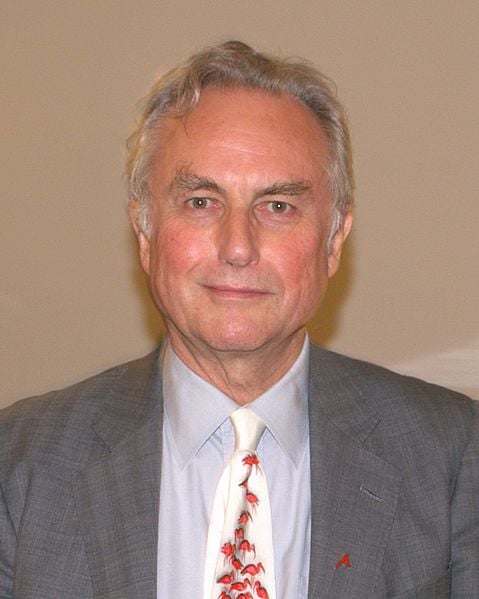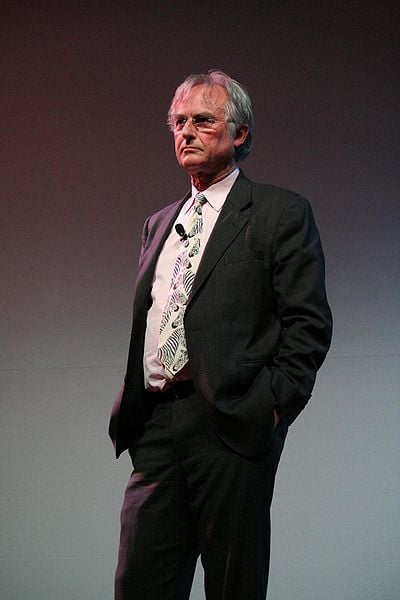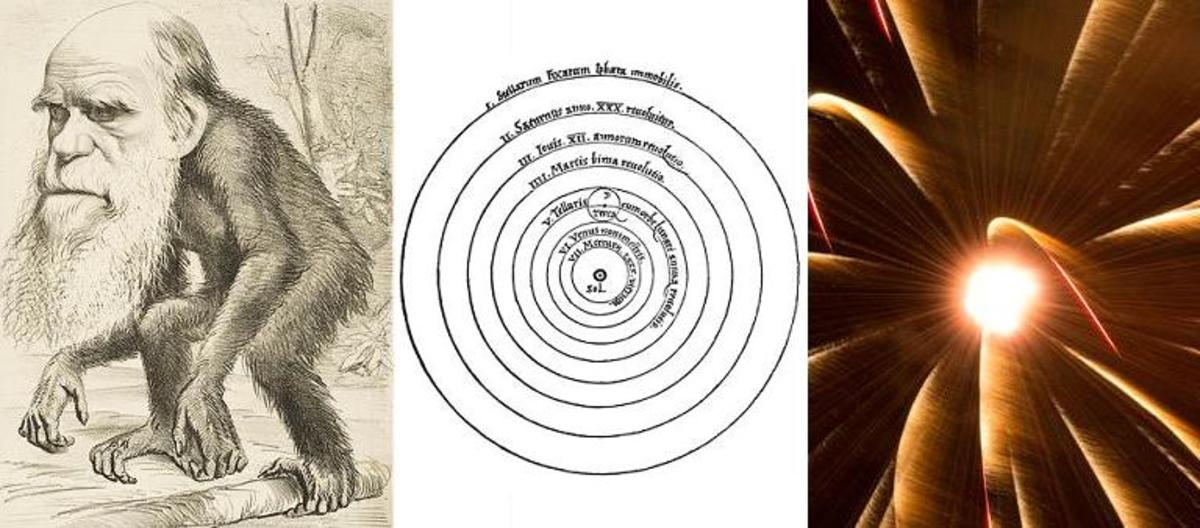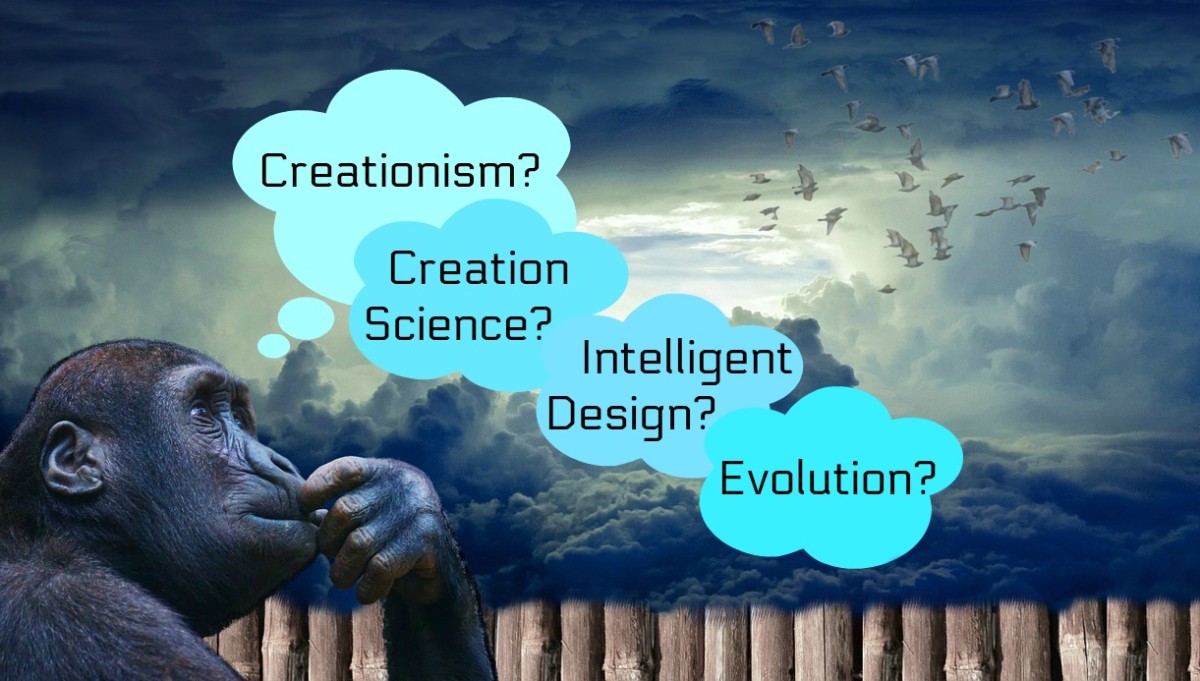The Atheist Delusion: A Study in Illogics

I've never met Richard Dawkins. A rumor has been going around for several years that someone by that name wrote a bestseller called, The God Delusion (Bantam Press, 2006). I know for a fact that Richard Dawkins does not exist.
Now, that fact is entirely illogical. It is an argument to ignorance—a logical fallacy. The fact that I currently have no proof of his existence, does not disprove his existence. Welcome to Logic 101. Oh, is that a picture of Mr. Dawkins at the top of this article? Perhaps there is some proof, after all. And no, this is not a book review on the 2007 work by Alister and Joanna McGrath (The Dawkins Delusion, IVP Books, 2007).
The elusive character named Dawkins seems super smart. He has observed a great deal of illogic coming from the super religious. Like any over-the-top fiction, the hero (in this case, super logic) is pitted against its mortal enemy (in our story the super believer). Dawkins is skeptical of their outlandish claims, and for good reason. They live in a small universe with a small God. His trusty mentor (science) has shown the universe to be old and large. But where is God in all this? Dawkins remains ardently skeptical of invisible, supernatural beings.
Regrettably, there are at least two kinds of skepticism. There is the more professional scientific restraint, and then there is the decidedly unprofessional, self-indulgent ridicule. It seems Mr. Dawkins and a few other scientists have chosen to use both forms of skepticism. Could it be arrogance that is blinding them to their use of something so unscientific?
While it is true that some Christians have delusional ideas about the universe, Mr. Dawkins generalizes his view of the entire religion, blaming the lot of them for a host of social ills. Some of the super religious blame atheists for the same list of problems. Who is right? Could it be that neither side is right? Could it be that something else is escalating this division into a full-scale war? Who or what could be doing this?
Skepticism's self-indulgent form frequently uses a logical fallacy called, ad hominem. This is a personal attack, which is neither professional nor scientific. An attack can be explicit or implied, but it remains a distraction from the issues at hand, rather than a dispassionate review of the issues. It seems that both sides of the religious divide use this form of skepticism.
When scientists as a whole swear off of such unprofessionalism, the all-inclusive field of science will have grown a bit more mature. I look forward to that. Individual scientists may choose to remain in the dark ages, deluded by their confusion over these two forms of skepticism, but civilization will have moved beyond the darker portion of the modern age of reason. Let us be clear—scientific restraint is not self-indulgent ridicule. These are opposites which sometimes pose as twin siblings under the umbrella term "skepticism." Regrettably, some cannot tell these so-called "twins" apart.

Religion, Violence, Ego and Humility
Dawkins makes a point of showing religion to be evil and a source of violence. As the McGrath's point out, atheists have been a source of great evil and violence, too. In fact, Dawkins' approach borders on the violent—verbally, at least. Atheist states such as Soviet Russia, Red China and Pol Pot's Cambodia have proven quite deadly to millions of individuals. To be fair, of course, the Catholic church has a few skeletons in its closet, too.
As an advocate of militant atheism, could Dawkins be attacking the wrong target? Say you get a flat tire. That is no cause for you to pull out your shotgun and shoot your dog in the passenger seat. Wrong target!
It seems the war against all religious folk has started. Dawkins said in a 2002 conference, "Let's all stop being so damned respectful." When the Dawkins bulldozers roll, will it wipe out the good with the bad? This reminds me of Hitler's hate of Jewish bankers. Not all of the women and children murdered in the ovens of Nazi concentration camps were destined to have become bankers. Perhaps only a scant few had that potential. And are all bankers bad? Are stereotypes bad?
Certainly, there are many of the religious who are crazy, militant and arrogant. Some are even dangerous. But does this make religion as a whole the culprit? And even if some institutions condone backward, unintelligent incursions into politics and science, does that condemn all religious institutions? Does it condemn all religious individuals?
There is an old saw that money is the root of all evil, and that's not it at all. Money is simply a tool. Human greed? Now, that is a different story. It is too easy for anyone to generalize inappropriately. Someone stole money and then lived a life full of evil; therefore money is the root of all evil. Hmmm-m-m! Sounds like an illogical delusion, to me. All the good people continued to use money without becoming evil, right? And contrary to the beliefs of both the religious and the secularists, the real evil is neither religion nor science. It is in the ego or selfishness. That which lives inside us is what is important, here. Objects and institutions are no more evil than the ground on which one walks. It is what humans do with their resources that can be good or evil. It is the intention behind their actions that can be judged good or bad.
Mr. Dawkins seems to let his ego get in the way of the quest for truth—though he seems moderately well equipped to investigate the relative truths which remain the products of science. And what happened to the skeptical restraint of a scientist? He may get things right in science, but is he using the same acumen with religion? It does not look like it. If I understand the tenets of science, a scientist needs to display more of a controlled attitude—what might more typically be called "selfless restraint"—rather than a dogmatic one (or worse, self-indulgent ridicule).
When one talks of the "laws" of science, one tends to become more rigid and dogmatic. That seems an unavoidable human trait. It seems one does not question "laws." Yet, the "laws" of Newton, for instance, were not 100% accurate. Einstein's Relativity proved that. And the search for truth (relative and otherwise) did not end with Einstein.
I have read the harangues of both the super religious and the super secularists (both sides are skeptical). Many on either side treat the issue as an "either-or" proposition, but it is not. The answers are not either science or religion. There is some truth to be found in both.
Humility and a sense of wonder go a long way in the quest of a scientist. It seems Mr. Dawkins has forgotten his place. His "holier than thou" attitude not only rubs many people the wrong way, but it also has adverse effects on him, as well. Fixed ideas of any kind are, in effect, blinders that prevent one viewing the possibilities. Self-imposed blinders are not good for anyone, including a scientist.
In the world of scientific breakthroughs, James Gleick wrote in his bestseller, Chaos: Making a New Science, "Shallow ideas can be assimilated; ideas that require people to reorganize their picture of the world provoke hostility." Scientists are not immune to this kind of childish behavior.
Not long ago, NASA scientists wrote about a microbe which thrives in an arsenic-laced environment. Scientists from all over seemed outraged even before a thorough study. Why the attitude? So many were busy pointing their skepticism cannons at others, but not at themselves. One action is arrogance; the other is humility.
So, where does God fit into all of this? Does He exist? Did He ever exist? Or did the deists get it right suggesting that God created the universe and then went on vacation? And it seems the "Dawkins" book suggests the deist's viewpoint as a possibility. This is, after all, God's day of rest—the last 13.7 billion years of it. Isn't it?

Here There Be Miracles
The existence of miracles implies something that transcends physical law. Physical, human bodies should, arguably, follow the laws of nature. Material objects, like Homo sapiens bodies, cannot break the laws of physical reality. These are "laws" that exist in nature, not "laws" formulated by humans to explain nature. These are the "laws" science is ever trying to discover. If Man is only a physical being, then yes, miracles would seem to be an impossibility. So, why have we had miracles?
Dawkins and other hardened skeptics do not believe in such supernatural claptrap. For them, it would seem, those "miracles" never happened or were misrepresented events—like the belief that Jesus walked on ice, instead of water, or the idea that Moses waded through a shallow swamp rather than parting the sea.
I for one have experienced the creation of several miracles—more than a dozen of them. The most startling of these involved more than two thousand automobiles and their drivers. On one of the busiest streets in Los Angeles—Wilshire Boulevard—traffic parted during rush hour for me like Moses supposedly parted the sea. More than two miles of center lane in front of me were devoid of cars, while the lanes left and right remained even more thick with snarling traffic. For four minutes, that lane remained empty ahead of me as I ran that gauntlet.
An unrestrained skeptic might say that coincidence was what ruled such an observation. (Notice here that jumping to a conclusion without having all the facts is not the act of a true scientist; a scientist would use restraint, would investigate, then arrive at a conclusion, if they felt they had all of the facts.) The self-indulgent skeptic might say that cause and effect had nothing to do with this so-called "miracle." But notice their conclusion before any investigation. Let us investigate this idea of coincidence versus creation.
One atheist, in a discussion online, brought up the obvious possibilities that the reporter of such miracles could be lying or delusional. When asked how they could be sure the things in their own life were not delusion, they were puzzled why I would ask such a thing. They did not stay around long enough for me to connect the dots. I found it intriguing that this atheist would admit to the possibility of miracles, but that it would take something persistent, like videotape for the evening news, to make the event objective instead of subjective. And what a curious sense of what is objective. Does this mean that there were no objective observations before videotape?
One oft-repeated philosophical question asks, "if a tree falls in a forest and no one is around to hear it, does it make a sound?" Well, of course it does. Both sights and sounds are created with or without an observer. The laws of reality do not stop merely because there is no videotape to record them. And just because there is a very specific miracle which temporarily suspends some of those laws, does not automatically mean that all laws, everywhere are suddenly suspended, as one atheist seemed to imply. Such a scary event would prove not to be a miracle, but chaos!
This second atheist suggested, too, that a miracle would not be observable, because the laws of nature which govern sight would no longer work. Again, chaos! Not a miracle.
The attitude of this second atheist reminds me of a science fiction short story I read years ago. In it a scientist had stumbled onto a formula which suddenly gave him the power to transport anywhere in the universe just by thinking about it. In terror, the scientist found himself being whisked to one place or another, as he thought about them. The one great terror was that he would think of one very dangerous place before he had a chance to finish his formula and allow for control over this new gift. The one place of which he dared not think proved to be the core of the sun.
And this raises the question that if anyone were to have the power to create a miracle, wouldn't that person also have the power to create all manner of chaos? Vaporize their own body by teleporting it into the core of the sun? Or vaporize Earth by teleporting stellar core material onto our world? When one fears something, like these potential tragedies, then ego takes over. Ego is vulnerable and fearful. The source of miracles is not. If a fearful thought happens to cross one's mind, the whim will not automatically gain access to the power which had previously created a miracle. Typing a fearful possibility onto your computer monitor does not create that disaster. Ego conjuring that possibility is just as likely to create that disaster. Both the computer monitor and ego have no ability to create such things. Both of these physical constructs must obey physical law.
My "hit-and-run" debating friend said, "Your 'belief' evidence is subjective, regardless of how much you want ot [sic] make it sound objective. Even if it happened, the event only happened because it was observed to occur - and then an opinion was formed as to what the event meant. That makes it all subjective - observer dependent."
They went on to say, "My life is no different regardless of the reality or delusional nature of this Wilshire event. However, if you do something concrete and permanent - regrow the arm of an amputee - well, now my life is different. It means that the very idea of nature has been changed."
Curious, indeed. Regrowing an amputated arm or videotaping a miracle on Wilshire Boulevard would change "the very idea of nature," but without videotape, the event is meaningless and subjective. And yet, there were more than 2000 witnesses to the Miracle on Wilshire Boulevard.
This atheist's meaning of "objective" and "subjective" seem a bit skewed. One website defined subjective as, "private 'mental' stuff: sensations, beliefs, feelings, emotions, opinions, etc." It also defined objective as, "public 'physical' stuff: publicly-observable things, events, knowledge, facts." Of course, one can objectify the subjective. For instance, one can observe that someone is fearful by the expression on their face, or by noting the words they speak. And one an subjectify the objective. For instance, one can form an opinion about a physical, objective event.

Admittedly, it is hard to remain dispassionate about this event. It was the most blissful event of my life. Naturally, we need to be careful about such strong emotion. Eleventh century Jewish mystic, Bayha ben Joseph Ibn Paquda said that bliss not grounded in reality is not bliss but delusion. He was a judge in the rabbinical court at Saragossa (Caesaraugusta), Spain. His point is well taken. We cannot ignore reality, even in something like faith or bliss. But let us take the bliss out of the event and look at it objectively.
One moment, this observer was feeling a great deal of frustration over the slowness and thickness of traffic. Adding to this frustration, the previous two blocks of Wilshire had seen six unsafe lane changes by other drivers that required quick brake action on my part to avoid collision. The next moment, a thought crossed my mind that I had been responsible for the six incursions. By my focus on frustration, I had invited those other drivers to add to my frustration, fueling an escalation in my emotion.

I want to clarify something. My thoughts here do not prove anything. I am merely relating the sequence of events as they unfolded—thoughts and feelings included. I am attempting to treat these subjective elements objectively.
The next moment, I felt completely at ease. Frustration had disappeared. I no longer viewed the other drivers as adversaries. I felt an extreme humility and reverence for those other drivers. I no longer thought in terms of me versus them.
Over the next 15–20 seconds, I reviewed earlier, similar events of apparent miracles I had performed. I thought about the mechanics of creation. I considered that 100% confidence (faith) was required. I considered the possibility that all one needs to do is picture the desired end result, and then to let go of that picture with the confidence that it is already done.
Those who have attended motivational seminars might recognize in this last sentence, the well-worn pattern of goal setting—stating one's goals as if they have already been accomplished. Why do smart businesspersons use such a technique? Could it be that it actually works?
I also considered as fact that I had used this method of creation and manifestation in escalating my frustration moments before.
I then pictured the idea that my mechanics of creation took a mental image—like the "word" in Genesis. Those mechanics took this image as an instantaneity possessing no time dimension, and then rotated it into the time stream to give it persistence by my "allowing" it or "letting it go." I saw this "release" of the timeless creation into the time stream as, in effect, the creator's "day of rest." And, it seemed to me, we are all creators, created in God's image.
At the end of this sequence of thoughts, I wanted to test my hypothesis. I created the picture in my mind of wide open spaces and smooth sailing all the way to my destination. In the next moment, the car directly in front of me moved into the already crowded lane to the left. Within five seconds, there were no cars directly in front of me for as far as I could see—over two miles of empty center lane.

Two Kinds of Coincidence
Okay, let us define our terms. Scientists use "coincidence" all the time. When they perform an experiment several times and get the same result, the observed effect "coincides" with the determined cause. When a scientist views strange tracks in a cloud chamber, they know now that these are signs of radiation. These tracks are methods of "viewing" the unviewable. And an important tool for nuclear physics was born.
Are there two kinds of "coincidence?" It seems so. There is the benign, matter-of-fact, coincidence that a scientist uses in the laboratory, and there is the pejorative use of the term to refer to the delusion someone might have that one event is related to another simply because they happened at the same time or that one followed the other in sequence.
How do we tell the difference between these two kinds of "coincidence?" One is cause and effect; and the other is accidental.
How many so-called "accidents" does it take before one considers the possibility that cause and effect are involved? Ten, a hundred, a thousand, or millions?
If several trillion gas molecules suddenly vacated a sphere of space, creating a vacuum several inches across that persisted for several minutes, one would be foolish to think that the pattern was the result of accident. The apparently random motion of gas molecules would prevent such an anomaly from occurring merely by chance.
One car moving out of my way after my thought of wide open spaces would certainly seem to be an accidental coincidence. Even three or four cars could reasonably fit under the banner of "accident."

When I was twelve, my family moved from West Texas to the D.C. area. Upon reaching Key Bridge to cross into the nation's capital, traffic did something entirely wonderful. At full speed, cars in relatively thick traffic were merging from two different lanes—first one car from one lane, then another car from the other. Each lane received equal time in the merge.
I had never before seen such a thing, and have not seen such since. The density of traffic at that time was conducive to this lock-step rhythm, so that dozens of cars smoothly repeated this apparent anomaly. Miracle? I didn't think so, at the time. Participation by each of those drivers was somehow self-serving. It was an amusing set of coincidences or accidents of circumstance. Any one driver hesitating would throw off the rhythm and destroy the pattern of motion. But I saw nothing supernatural, that day. Yet, even then, I had my doubts that it had been entirely accidental. Our arrival that day on my father's spiritual quest from West Texas seemed special. And perhaps it was.
On Wilshire Boulevard, I had not only roughly two thousand cars participating in my silent request, but I had their cooperation over an extended period of time—long enough for me to speed up and traverse the two miles past the former wall of traffic.
Each car that moved out of the way was a coincidence with my creation. Also, each car that did not move into the center lane was another coincidence. But like the statistically random motion of air molecules, the drivers could have, at any moment, randomly decided to enter the center lane in front of me. And traffic is not random, but deterministic.

Driver-Decision-Moments of Coincidence
Using past experience with drivers in traffic, a large percentage of them typically would not let an empty lane remain empty for long. Yet, this time, they did. What was going on? What motivation did they have to allow the lane to remain vacated for so long? There were no emergency sirens blaring. There was no mortal "law" compelling them to evacuate the center lane. And yet they did so for an extended period—long enough to establish an extremely atypical situation for rush hour traffic.
We have the "decision moments" of each driver to consider. Each moment they decided to remain in their already crowded lanes is an additional coincidence. How long is a decision moment? Any figure would be largely arbitrary, but let us use a modest figure for discussion's sake. Let us say that each second that a driver does not decide to change lanes and take advantage of the one empty center lane is a coincidence.
At thirty miles per hour, I could traverse two miles of Wilshire in four minutes. At the end of that two miles, I have zero cars that could threaten to block my escape. At the start, I have two thousand cars with the potential to enter the center lane. The average is one thousand cars over the four minutes of travel. Four minutes is 240 seconds, and 240 times 1000 yields 240,000 driver-decision-moment coincidences.
Statistically, I would say we have a miracle, there—or an example of "mind over matter," or creation-persistering (where "persister" is the act of making a creation, or instantaneity, persist).
I cannot be proud of this miracle on Wilshire Boulevard. Pride in this matter is ego taking credit for something it did not do. The ego-self and the true, immortal self are as different as night and day.
Such a miracle does not prove God, directly, but it implies the possibility of God. No purely physical being could bend, break or circumvent the laws of nature. It seems to me that only a spiritual source of creation could do such a thing.
This miracle seems to have been a creation of the "child of God," within. No physical object—no Homo sapiens body, or reality-bound ego—could create such an effect in this manner.
Only later did I realize that any doubt would have fouled the experiment. It seems that 99.999999% confidence is as good as zero confidence (or faith) in the discontinuous realm of creation and spirit. Perhaps you have heard of the biblical story of Peter, when he stepped out of the boat to meet his teacher on the storm-tossed Sea of Galilee. His doubt ruined his miraculous contravention of physical law, and he started to sink. But for a moment, he had done it—walked on water—until he was distracted by fear and began to doubt his ability.
Doubt sometimes is not an easy thing to live with. Certainty in one's doubt can, at times, be characterized as obliviousness. This is when evidence is there, but one chooses not to look. Some declare that it did not happen unless there was videotape. Is such doubt a delusion? Perhaps not in this case. Some people require proof before they will consider something possible. That is understandable. Curiously, creation does not work that way. A scientist with skepticism (and its inherent doubt) cannot perform an experiment on miracles. Wrong ingredients! And scientists should know better.
Does the existence of miracles, which personally I have seen many, prove spiritual beings or perhaps something else superior to physical reality? Certainly, they suggest such. Does the existence of spiritual beings suggest that God is a possibility? I would think so, especially if God (Creator of the universe) was really the aggregate sum of all spiritual beings acting in concert. Could you be a piece of God—immortal spirit and source of creation, wrapped in Homo sapiens flesh? Did Rene Descartes think so when he said, "dieu en moi" (God in me)?

Belief versus Reality
Now, Richard Dawkins may think he knows that belief in God and miracles is a delusion, but his view is in itself a delusion. Many dogmatists of the past have wrapped themselves in such delusions. The world is flat, but Christopher Columbus did not fall off the edge. And despite what the Church had to say about Earth's central location, civilization has sided with Galileo, not out of any delusion, but out of empirical evidence. Some of the Church leaders would not look through Galileo's telescope for fear they would see the proof that another heavenly body is the center of its domain—namely Jupiter and its four Medician Stars, honoring Galileo's patron, Cosimo de Medici, and his three brothers.
Not only is Earth not the center of the universe, but there is no center at all—not in the physical sense. And like the Church leaders of Galileo's day, skeptics like Dawkins fear not to look, lest they see the proof that confounds their disbelief. They hide behind incomplete (unimaginative) logic and the distraction of self-indulgent ridicule.
One secularist skeptic with whom I have debated suggested that any manner of craziness would be possible if even one miracle were possible. Okay, and so what? They seemed to imply that only chaos would result. They seemed to suggest the "either-or" proposition that either we have an ordered universe controlled by the stable laws of nature, or reality is subject only to the erratic whims of an invisible being. This reasoning lacks a great deal in imagination, and it does not take much imagination to create another possibility. Creation can be ordered and very reasoned. The first "miracle" was the creation of this universe. Very nicely done, if you ask me. Everything seems to work—time, space, gravity, electro-magnetism, nuclear bonding forces—the whole lot of it. Why would another, more minor miracle mess things up? That is entirely illogical. So much for the imperfect fears of my secularist skeptic.
I have invited a number of secularist skeptics to read my "Anatomy of a Miracle" article. I do not know of any who have taken me up on this invitation. None have yet left any comments to debate the details of the incident. Only a couple seem to have glanced at it, but even they would not talk of the details. Was there something threatening about those details?
I have mentioned the incident in some forums only to get ridicule from some who seem to hold scientific acumen in high regard. Is science "ridicule?" Hardly, though too many scientists use that less-than-admirable weapon, and the skeptical forums are rife with such ridicule. One could say that such ridicule is "ridiculous." One secularist skeptic expressed disbelief, not of the incident, but that "parting traffic" would be all I would ask for. They seemed to suggest that I should have asked for something more selfish. A million dollars, perhaps? Why stop there? Their selfish and small imaginations could only think of small and selfish reasons. They cannot imagine how such a simple request on such a large scale could be so valuable.
Some scientists demand proof of miracles (while others don't care to discuss such things). That is understandable, but miracles do not work that way. Doubt is the fire extinguisher on the flame they are attempting to observe. When weighing a sample in the laboratory, one cannot expect accuracy if one's thumb is on the scale. Doubt does that. I cannot say this loudly enough. Take a lifetime, if you must, to let it sink in.
Richard Dawkins belief in something does not automatically make it true. Similarly, his disbelief in something—God, for instance—does not make it false.
Even if someone caught Mr. Dawkins off guard, and performed a startling miracle in his presence, does he have too much invested in his limiting and prejudiced point-of-view? Would he even see the miracle? Many with such strongly held beliefs would likely be blind to events that did not fit anywhere close to their world view. Such overpowering disbelief would constitute a very real delusion.
On one television program of strange phenomena, they showed the picture of a young man who liked to sky dive. One of his attempts resulted in chute failure. He plummeted toward the ground facing certain death. In the few moments he had left, he asked God to take him. Whether or not there is a God, is not the point here. He became humble, and humility is the antidote to ego. Only when ego is gone, can the true, immortal self stir from its slumber. Only then can miracles happen. The fact that he walked away with only a few scratches is a very objective, real, and tangible miracle.
There are many "scientific" attempts to try to explain how such a thing was possible, but for a moment, he was in that fearless state (what he called "giving it up to God") and gained his "bulletproof vest." Regrettably, he became full of ego (something I have risked by sharing my Wilshire story). He felt invulnerable. He jumped out of an airplane a few weeks later, but this time without a parachute, certain that his charmed life would save him. Ego, being a physical universe construct, can never be the source of miracles, just as a rock cannot perform miracles. More ego, means a deeper sleep for the powerful immortal within. This time, the ground took the cocky skydiver with a vengeance. This is the difference between faith and arrogance—a very tangible difference.

How many primitive tribesmen refuse to see an airplane flying overhead? Perhaps they only start to see it when their fellow tribesmen talk about the new "god" in the sky. And in myths of old, could the centaur merely have been a rider on horseback as seen by someone who had never before observed horses used domestically? Disbelief that a man could control such a beast might have blocked the observation of the critical details which would have revealed the truth—simply that an ordinary horse was being controlled by an ordinary human.
Could Cecrops, founder of Athens, have been merely a normal man popping the hatch of his serpent-shaped airship ("drakon" in Greek), instead of being half-man, half-snake? Could the Egyptian tale of a merchant prince rescued and nursed to health by a dragon have similar meaning? The prince saw at times the dragon as a monster and sometimes as a man, speaking with the same voice. Could this merely have been the ship's pilot—sometimes inside the craft, sometimes outside? But how could such things be possible? Certainly an earlier Atlantis did not exist with an advanced technology. Right? Or did it? And yet we have proof of an Atlantis-like event occurring right when Plato said the fabled island had subsided. Each of these pieces of evidence comes from a different scientific discipline. Even with such proof, scientists will not look, because "Atlantis" is the new blasphemy. So much for proof!
Things which are outside our worldview tend to make us miss details, and perhaps sometimes the whole picture. Such partial blindness is also a very real delusion. Fixed ideas get in the way when one cannot see the proof that confounds those fixed ideas.
Attempting to convince anyone of miracles is thus likely a wasted effort. And miracles are not some tool of debate to be used as evidence of God and god-like abilities or power. Sometimes I imagine bonking a secularist skeptic over the head with a miracle to help wake them up, but that is only my own ego talking; and ego is the real enemy. It has been said that one cannot make a silk purse out of a pig's ear. Someone who has decided not to look cannot be forced to do so. One can believe miracles are possible, disbelieve them, or from experience or faith, know that miracles exist.
As in any scientific investigation, certain ingredients are necessary to perform an experiment. Miracles are for the edification of the true self—awakening the spiritual half of ourselves. They are not a sales tool to be used on the "bah humbug" audience. One of the most important ingredients in an experiment on miracles is a desire for one's own spiritual awakening. Also, a miracle requires utter humility. Can you imagine Richard Dawkins with such humility? I can. Another important ingredient is the faith—100%, untarnished confidence—in the power of God within. Using such power to convince a skeptic is like using God's name in vain. Tsk-tsk!
Attempting to perform miracles without faith in God (100% confidence and utter humility) is like jumping out of an airplane without a parachute or a prayer. Splat!

Richard Dawkins and God
If skeptics were to use their imaginations, plus a scientist's measure of restraint, they might imagine other possibilities on the question of the existence of a personal and active God. Why doesn't God show Himself? What reasons could He have for remaining behind the scenes? I can think of a few. What if our spiritual awakening cannot occur with such interference; i.e. we have to decide for ourselves to use humility and search for our own awakening. It cannot be spoon fed to us. God cannot dazzle us into awakening.
Why are prayers of the believers never answered? Who said "never?" How can anyone ever prove that prayers are never answered? Okay, what if prayers are rarely answered? Why does God ignore so many? And who says God is ignoring anyone? Could it be, instead, that most people do not know how to ask for a miracle? When one gets it right, prayers are always answered instantaneously and in the affirmative. Always! Yes, always! But the way is narrow, and few can make the passage. And some who have made the passage, do not yet have the spiritual skills to remain there.
The active, and personal God is within each of us, waiting for each of us to awaken Him. Again, as Rene Descartes, the famous mathematician, once said, "dieu en moi"—"God in me." Perhaps the most important line in the entire Bible describes that God created us in His image. It does not take much imagination, or intelligence, to see where that leads us—that we are baby gods.
Too many of the religious are afraid to look there, because the idea seems blasphemous. And indeed, it remains a blasphemy if the baby god is equated with ego. One of these (the spiritual half of us) is from the timeless realm of creation, and the other is a created pseudo-self of continuity-bound, physical reality. God created baby gods—flesh of His flesh, and bone of His bone (only, spirit is not made of such physical stuff). Then, these baby gods fell into a deep sleep, poisoned by a conceptual matrix known to many as the "forbidden fruit," which manifests itself as ego. Only later did God create Homo sapiens—the physical part that we know so well. And this physical form was for God's children to have a method for reawakening. This is a new, albeit incomplete, interpretation of Genesis—a theological hypothesis based on a lifetime of experience and study.
If you are skeptical, say for a moment that miracles do exist. Why are they so rare? I can think of a very good reason why we don't see more often the miracles which confound, bend or break the laws of physical reality. It does not take the imagination of Einstein to conjure such possible answers; and Einstein valued imagination more than knowledge. What if the road to the ability for miracles is razor thin? I remember once thinking that perfect "10's" in Olympic gymnastics were an impossibility, but a little Romanian girl changed that. Perhaps if enough people talk about miracles, then the "gee whiz" factor will disappear. Perhaps then, they will become more commonplace.
Rather than pout like a spoiled child and demand God prove Himself, we need to take responsibility as children of God and awaken that immortal, spiritual part of ourselves, within. Faith comes before proof, and proof in this matter is of little importance.
Of course, some would merely rather hide behind their shield of disbelief, refusing to bother with something which likely does not exist anyway. That is their choice. That is their blindness.
I've never met Richard Dawkins. I know for a fact that he does not exist.
Want More?
For a uniquely different approach to the subject, check out www.The-Love-Of-God.com—a loving, vitally interested God, and the tools He has used to help us come back to Him.
Rod Martin, Jr. is a past Hollywood artist, software engineer and award-winning essayist from Texas, USA. Mr. Martin currently lives with his wife in Cebu, Philippines. He is also the author of the forthcoming book, The Bible's Hidden Wisdom, God's Reason for Noah's Flood.—http://www.GenesisCode.Net.















